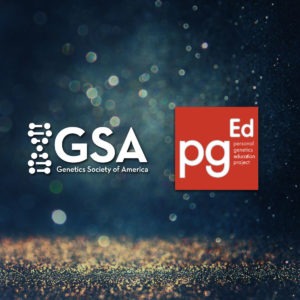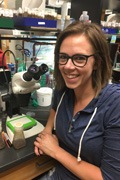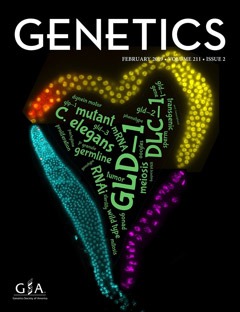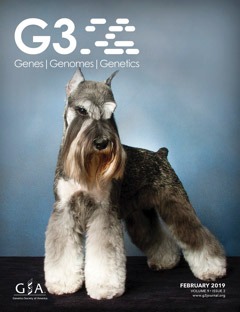Inclusive Public Engagement for Geneticists
 GSA and Personal Genetics Education & Dialogue (PGED) of Harvard Medical School have partnered to build public dialogue about genetic technologies. Our joint programs aim to better equip scientists to engage in discussions about genetics with all communities, with special emphasis on those who have been marginalized, economically disadvantaged, or otherwise excluded from conversations about science. Learn more about the partnership ≫
GSA and Personal Genetics Education & Dialogue (PGED) of Harvard Medical School have partnered to build public dialogue about genetic technologies. Our joint programs aim to better equip scientists to engage in discussions about genetics with all communities, with special emphasis on those who have been marginalized, economically disadvantaged, or otherwise excluded from conversations about science. Learn more about the partnership ≫
WEBINAR SERIES
Meeting the Moment: strategies for contributing to a broad conversation on genetics and society
Past Events
Discussing Genetics: Science Engagement with Faith Communities
Thursday, September 29, 2022
Faith communities are important partners in achieving far-reaching and bi-directional public engagement in response to rapid innovations in genetics. Most of the American public identifies as religious or spiritual. This can be a core element of personal and community identity, and informs people’s perspectives on science and technology topics, including ideas about genes, gene-editing, and what it means to be human. Moreover, religious leaders are often on the frontlines when people look for counsel and guidance about health and family-planning. Conversely, bridging the conversation between faith and genetics communities can play a valuable role in (1) informing how scientists approach the development and application of genetic tools and (2) influence the language scientists use to talk about genetics, so they are more welcoming of people from a variety of faith traditions and cultural backgrounds.
Join pgEd for a short interactive workshop by our colleague, Dr. Rob O’Malley, project director for the AAAS Dialogue on Science, Ethics, and Religion (DoSER) program. In this workshop, attendees will:
- Learn how culture, including religion and spirituality, are important considerations for inclusive public engagement with science
- Consider and discuss evidence-based best practices for science engagement
- Apply the workshop content in an exercise with fellow attendees
Who should attend: Genetics or biology researchers or educators at any career stage, including students, postdocs, and faculty.
Facilitator Bio:
Dr. Rob O’Malley (he/him) is a project director for the Dialogue on Science, Ethics, and Religion (DoSER) program of the American Association for the Advancement of Science (AAAS). Prior to joining AAAS in 2016 he conducted field research on wild chimpanzees in Tanzania, and taught biological anthropology at four colleges and Universities across the U.S. He currently serves as co-chair of the Education Committee of the American Association of Biological Anthropologists (AABA). At AAAS, he creates media resources, events, and science communication workshops to support science engagement activities that are inclusive of diverse faith perspectives. He regularly develops and participates in public engagement with science activities, from virtual classroom visits, to casual museum conversations, to panels at science fiction conventions.
Difference, not deficit: Reframing the conversation around genetics, deafness, and disability
Tuesday, May 10, 2022
Public engagement requires us to interrogate our language and the thinking behind it. What ideas are embedded in our language about genetics? What messages are we sending? How are people being impacted? In approaching these questions with humility, we have an opportunity to dismantle barriers that are excluding people from engaging with genetics, learn about assumptions that can cause harm, and create inclusive environments in our labs and classrooms.
Join pgEd for a program with our colleagues from Gallaudet University and the ASL Education Center who have challenged our thinking, expanded our minds, and illuminated pathways for engaging with deaf and hard-of-hearing people. The webinar will include:
An exploration of how deficit is embedded in language and how that impacts people
Strategies for creating educational spaces that welcome deaf and hard-of-hearing people
Approaches for engaging learners in conversations about differences and disability
Who should attend: Genetics or biology researchers or educators at any career stage, including students, postdocs, and faculty.
The webinar will be presented in American Sign Language (ASL) and English. Closed captioning and live transcription will be available as well.
Invited Guests:
Teresa Blankmeyer Burke, PhD, Professor of Philosophy and Bioethicis, Gallaudet University
Rachel Boll, M.A., Co-Director of the ASL Education Center
Derek Braun, PhD, Professor of Microbiology and Genetics, Gallaudet University
Jeanne Reis, MEd, Co-Director of the ASL Education Center
Discussing Genetics: Exploring Human Sex Variation through Athletics
December 15, 2021
Athletics events (commonly referred to as track and field in the US) are often divided into men’s and women’s categories to provide fair competition, but efforts to define who qualifies to compete in the women’s events have been fraught with controversy. Since the 1940’s, athletics governing bodies have required competitors in women’s events to prove themselves female (first through anatomical exam, then through DNA-based tests, and now through testosterone levels), but differences in sex development mean that some individuals do not fit neatly into the male-female binary.
The webinar included:
- Key considerations when discussing human sex variation
- Discussion strategies for engaging broad audiences and handling difficult moments
- An introduction to pgEd’s lesson on sex, genetics, and athletics
- Interactive discussion and modeling of pgEd’s conversation starters
Speakers from PGED:
Robin Bowman, M.Ed.
Marnie Gelbart, PhD
Invited Guest:
Bria Brown-King, Director of Engagement, interACT
Discussing Genetics: Genome Editing and the Environment
May 12, 2021
View Post-Workshop Resource List
The emergence of genome editing technologies, such as CRISPR, have opened new possibilities for engineering the world around us. Scientists are considering ways to apply these tools to address agricultural and environmental issues—modifying crops (for herbicide tolerance, drought resistance, and so on), gene drives to counter vector-borne diseases (e.g., malaria), and even reviving extinct species. Some hail the use of these approaches, while others worry about unintended consequences of these ecosystem-changing actions.
The webinar included:
- Key considerations when discussing genome editing and the environment
- Discussion strategies for engaging broad audiences and handling difficult moments
- An introduction to pgEd’s lesson on genome editing and the environment
- Interactive discussion and modeling of pgEd’s conversation starters
Discussing Genetics: Reproductive Genetics
April 14, 2021
View Post-Workshop Resource List
Reproductive genetic technologies, including preimplantation genetic diagnosis (PGD) and non-invasive prenatal testing (NIPT), can allow people to learn more about the DNA of an embryo or fetus than ever before. For some people, genetic testing in reproductive healthcare provides an important decision-making tool; for some, these tests raise a suite of practical, ethical, moral, and religious questions. And the advent of CRISPR is bringing hopes for a new generation of genetic therapies as well as concerns that germline editing could lead to a new eugenics, exacerbating disparities and stigmatizing people living with perceived disabilities.
Join PGED to learn about their experiences and strategies for engaging with broad audiences — from high school students to communities of faith — in sensitive conversations about reproductive genetics. The webinar included:
- Key considerations when discussing reproductive genetic testing
- Discussion strategies for engaging broad audiences and handling difficult moments
- An introduction to PGED’s lesson on reproductive genetic testing
- Interactive discussion and modelling of PGED’s conversation starters
Discussing Genetics: History of Eugenics
March 10, 2021
View Workshop Summary and Resource Packet
The history of genetics is deeply entwined with the eugenics movement. Some fear that today’s genetic advances, despite the great potential for societal benefits, could lead to a new era of eugenics. How can geneticists invite inclusive discussions on this important topic in our classrooms, labs, and communities? Join pgEd to learn about their experiences and strategies for engaging with broad audiences — from high school students to communities of faith — in sensitive conversations about genetics and the history of eugenics. The webinar will include:
- Key considerations when approaching the history of eugenics
- Discussion strategies for engaging broad audiences and handling difficult moments
- An introduction to the history of eugenics, as presented in a pgEd lesson
- How pgEd has adapted their lessons to include more diverse communities and perspectives
- Interactive discussion and modeling of pgEd’s conversation starters



